Mar 26, 2023
collocations
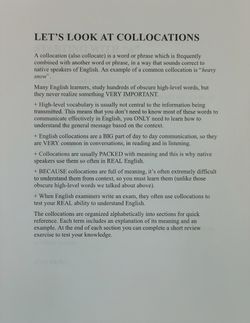
natural English...
the fast train
fast food
a quick shower
a quick meal
unnatural English...
the quick train
quick food
a fast shower
a fast meal
How to learn collocations
1. Be aware of collocations, and try to recognize them when you see or hear them.
2. Treat collocations as single blocks of language. Think of them as individual blocks or chunks, and learn strongly support, not strongly + support.
3. When you learn a new word, write down other words that collocate with it (remember rightly, remember distinctly, remember vaguely, remember vividly).
4. Read as much as possible. Reading is an excellent way to learn vocabulary and collocations in context and naturally.
5. Revise what you learn regularly. Practise using new collocations in context as soon as possible after learning them.
6. Learn collocations in groups that work for you. You could learn them by topic (time, number, weather, money, family) or by a particular word (take action, take a chance, take an exam).
7. You can find information on collocations in any good learner's dictionary. And you can also find specialized dictionaries of collocations.
There are several different types of collocation made from combinations of verb, noun, adjective etc. Some of the most common types are:
adverb + adjective: completely satisfied (NOT downright satisfied)
adjective + noun: excruciating pain (NOT excruciating joy)
noun + noun: a surge of anger (NOT a rush of anger)
noun + verb: lions roar (NOT lions shout)
verb + noun: commit suicide (NOT undertake suicide)
verb + expression with preposition: burst into tears (NOT blow up in tears)
verb + adverb: wave frantically (NOT wave feverishly)
1. adverb + adjective
Invading that country was an utterly stupid thing to do.
We entered a richly decorated room.
Are you fully aware of the implications of your action?
2. adjective + noun
The doctor ordered him to take regular exercise.
The Titanic sank on its maiden voyage.
He was writhing on the ground in excruciating pain.
3. noun + noun
Let's give Mr Jones a round of applause.
The ceasefire agreement came into effect at 11am.
I'd like to buy two bars of soap please.
4. noun + verb
The lion started to roar when it heard the dog barking.
Snow was falling as our plane took off.
The bomb went off when he started the car engine.
5. verb + noun
The prisoner was hanged for committing murder.
I always try to do my homework in the morning, after making my bed.
He has been asked to give a presentation about his work.
6. verb + expression with preposition
We had to return home because we had run out of money.
At first her eyes filled with horror, and then she burst into tears.
Their behaviour was enough to drive anybody to crime.
7. verb + adverb
She placed her keys gently on the table and sat down.
Mary whispered softly in John's ear.
I vaguely remember that it was growing dark when we left.
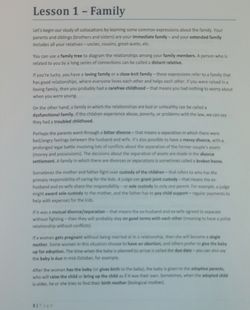
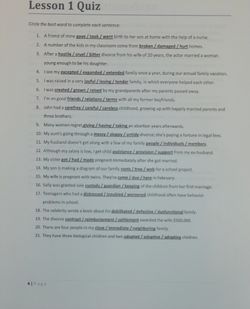
Adjectives frequently used with family
poor: disadvantaged, low-income, needy, poor
The grant is awarded to students from low-income families.
rich: rich, wealthy, well-off, well-to-do
He came from a wealthy family.
having two parents living together: two-parent
Unfortunately, the report concludes that many fathers in two-parent families have low involvement with their children’s education.
where one parent is reponsible for the family: lone-parent, one-parent, single-parent
One-parent families still have the greatest risk of poverty of any family type.
loving and caring: close-knit, loving
We are a very close-knit family and spend a lot of time together.
having problems: dysfunctional
I was a lonely young man from a dysfunctional family.
including aunts, uncles, cousins etc: extended
Balinese communities function more like large, extended families than the disconnected societies of the West.
including just parents and children: immediate, nuclear
This is a free confidential help line, which is available to all staff and their immediate family.
There is a decline in the number of traditional nuclear families.
big: big, large
Ann then married Thomas Kennedy and had a large family.
when a child has been adopted or is being cared for by a family
that is not its own: adoptive, foster
We are always looking for adoptive families for children aged between four and nine.
She lived with various foster families in the 1980s.
Verbs frequently used with family
feed, clothe, educate etc children: bring up, feed, raise, support
Most of the group were widows, many struggling to support large families.
have children: start
In the past, women gave up their jobs when they started a family.
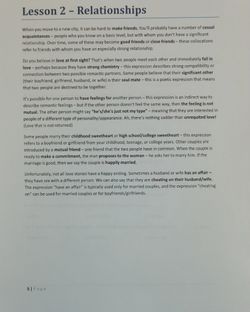
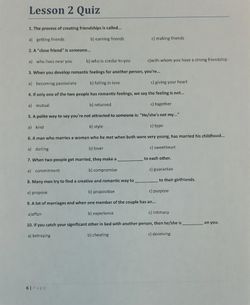
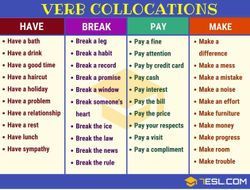

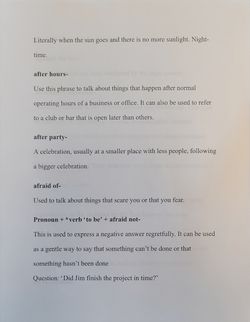
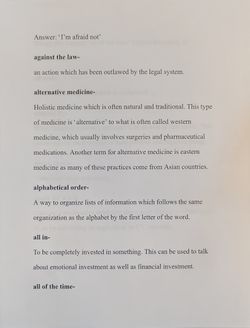
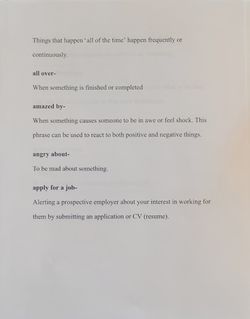
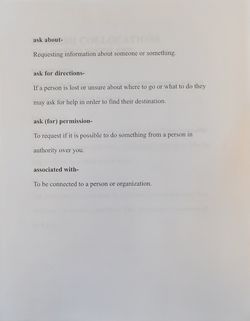
By undefined
20 notes ・ 68 views
English
Upper Intermediate